| Listing 1 - 9 of 9 |
Sort by
|
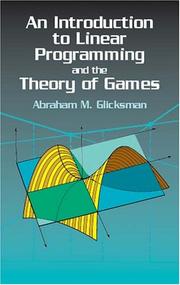
ISBN: 9780486417103 0486417107 Year: 2001 Publisher: Mineola: Dover,
Abstract | Keywords | Export | Availability | Bookmark
 Loading...
Loading...Choose an application
- Reference Manager
- EndNote
- RefWorks (Direct export to RefWorks)
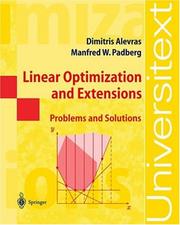
ISBN: 3540417443 Year: 2001 Publisher: Berlin : Springer,
Abstract | Keywords | Export | Availability | Bookmark
 Loading...
Loading...Choose an application
- Reference Manager
- EndNote
- RefWorks (Direct export to RefWorks)
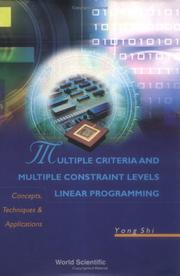
ISBN: 9810237383 9789810237387 Year: 2001 Publisher: Singapore: World scientific,
Abstract | Keywords | Export | Availability | Bookmark
 Loading...
Loading...Choose an application
- Reference Manager
- EndNote
- RefWorks (Direct export to RefWorks)
Linear programming. --- Multiple criteria decision making. --- Linear Programming.
Dissertation
Year: 2001 Publisher: Gembloux : Paris-Grignon : FUSAGx ; Institut National Agronomique,
Abstract | Keywords | Export | Availability | Bookmark
 Loading...
Loading...Choose an application
- Reference Manager
- EndNote
- RefWorks (Direct export to RefWorks)
Binary logistic regression is the most frequently used form of logistic regression. We deal with ungrouped binary data because predictors are continuous. Base rate is defined as the proportion of data having a value of the dependant variable equal to 1. We study the effect of base rate on the quality of validation of models. Selection of predictors and fitting usually use the same sample. We also study the effect of using two separate samples for selection and fitting. We first summarize important concepts about binary logistic regression. Those concepts are illustrated with a first example. We then show with three other real data sets that the proportion of individuals coded as 1 may have an impact on the quality of validation. Quality of validation decreases slightly when selection and fitting are operated on two separate samples. The second part of our work is to confirm what we have seen on real data sets. For this we generate artificial data. Tested factors are : proportion of 1, level of variability of random effect, significance level in selection, number of predictors and number of samples. On condition that the random effect and the base rate are high enough, quality of models is good especially when selection and fitting are realized on the same sample. When using a proportion of 1 close to 50 %, the effect of number of samples, significance levels and number of variables are nearly negligible. This research should be continued on other structures of data.
Sampling --- Simulation models --- Data analysis --- Linear programming
Book
ISBN: 2891057872 9782891057875 Year: 2001 Publisher: Boucherville: Gaëtan Morin,
Abstract | Keywords | Export | Availability | Bookmark
 Loading...
Loading...Choose an application
- Reference Manager
- EndNote
- RefWorks (Direct export to RefWorks)
Recherche opérationnelle --- Modeles mathematiques --- Programmation lineaire --- Analyse de reseau (Planification) --- Gestion --- Linear Programming --- Mathematical models --- Operations research
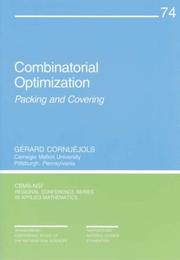
ISBN: 0898714818 9780898714814 Year: 2001 Volume: 74 Publisher: Philadelphia: Society for industrial and applied mathematics,
Abstract | Keywords | Export | Availability | Bookmark
 Loading...
Loading...Choose an application
- Reference Manager
- EndNote
- RefWorks (Direct export to RefWorks)
Combinatorial packing and covering --- 519.8 --- 681.3*G16 --- Covering and packing, Combinatorial --- Packing and covering, Combinatorial --- Combinatorial analysis --- Combinatorial designs and configurations --- Operational research --- Optimization: constrained optimization; gradient methods; integer programming; least squares methods; linear programming; nonlinear programming (Numericalanalysis) --- 681.3*G16 Optimization: constrained optimization; gradient methods; integer programming; least squares methods; linear programming; nonlinear programming (Numericalanalysis) --- 519.8 Operational research
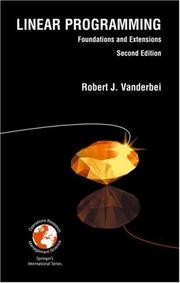
ISBN: 0792373421 147575664X 1475756623 9780792373421 Year: 2001 Volume: 37 Publisher: Boston: Kluwer Academic Publishers,
Abstract | Keywords | Export | Availability | Bookmark
 Loading...
Loading...Choose an application
- Reference Manager
- EndNote
- RefWorks (Direct export to RefWorks)
Linear Programming: Foundations and Extensions is an introduction to the field of optimization. The book emphasizes constrained optimization, beginning with a substantial treatment of linear programming, and proceeding to convex analysis, network flows, integer programming, quadratic programming, and convex optimization. The book is carefully written. Specific examples and concrete algorithms precede more abstract topics. Topics are clearly developed with a large number of numerical examples worked out in detail. Moreover, Linear Programming: Foundations and Extensions underscores the purpose of optimization: to solve practical problems on a computer. Accordingly, the book is coordinated with free efficient C programs that implement the major algorithms studied: -The two-phase simplex method; -The primal-dual simplex method; -The path-following interior-point method; -The homogeneous self-dual methods. In addition, there are online JAVA applets that illustrate various pivot rules and variants of the simplex method, both for linear programming and for network flows. These C programs and JAVA tools can be found on the book's webpage: http://www.princeton.edu/-rvdb/LPbook/. Also, check the book's webpage for new online instructional tools and exercises that have been added in the new edition. .
Linear programming --- Mathematical optimization --- 519.85 --- 519.85 Mathematical programming --- Mathematical programming --- Optimization (Mathematics) --- Optimization techniques --- Optimization theory --- Systems optimization --- Mathematical analysis --- Maxima and minima --- Operations research --- Simulation methods --- System analysis --- Matrices --- Production scheduling --- Programming (Mathematics) --- Substitutions, Linear --- Transformations (Mathematics) --- Vector analysis --- Linear programming. --- Linear Programming --- Mathematical optimization. --- Operations research. --- Management science. --- Decision making. --- Mathematical models. --- Computer science—Mathematics. --- Operations Research, Management Science. --- Operations Research/Decision Theory. --- Optimization. --- Mathematical Modeling and Industrial Mathematics. --- Mathematics of Computing. --- Models, Mathematical --- Deciding --- Decision (Psychology) --- Decision analysis --- Decision processes --- Making decisions --- Management --- Management decisions --- Choice (Psychology) --- Problem solving --- Quantitative business analysis --- Statistical decision --- Operational analysis --- Operational research --- Industrial engineering --- Management science --- Research --- System theory --- Decision making

ISBN: 0534373631 Year: 2001 Publisher: Pacific Grove (Calif.) : Duxbury press,
Abstract | Keywords | Export | Availability | Bookmark
 Loading...
Loading...Choose an application
- Reference Manager
- EndNote
- RefWorks (Direct export to RefWorks)
658.7 --- 658.513 --- Material requirements planning --- -Materials management --- -Business logistics --- -Industrial procurement --- -Marketing channels --- -Linear programming --- 658.5 --- 658.012 --- Matrices --- Production scheduling --- Programming (Mathematics) --- Substitutions, Linear --- Transformations (Mathematics) --- Vector analysis --- Channels, Marketing --- Channels of distribution --- Distribution channels --- Gray market --- Physical distribution of goods --- Buyer-supplier relations --- Buying, Industrial --- Industrial buying --- Industrial equipment --- Industrial purchasing --- Procurement, Industrial --- Purchasing, Industrial --- Supplier-buyer relations --- Industrial management --- Purchasing --- Supply chain management --- Logistics --- Materiel management --- Business logistics --- Inventory control --- Material accountability --- Materials requirements planning --- MRP (Manufacturing) --- Materials management --- Flexible manufacturing systems --- Buying. Purchasing. Procurement. Management of stock --- Supervision of production work. Follow-up, progressing, expediting. Scheduling --- Mathematical models --- Productiebeleid --- Planning in het bedrijf --- Voorraadbeleid. Inkoopbeleid --- Industrial procurement --- Linear programming. --- Marketing channels --- Mathematical models. --- 658.7 Buying. Purchasing. Procurement. Management of stock --- 658.513 Supervision of production work. Follow-up, progressing, expediting. Scheduling --- Linear programming
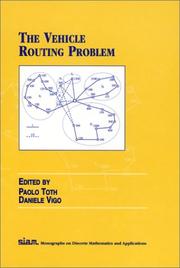
ISBN: 0898714982 Year: 2001 Publisher: Philadelphia : Society for Industrial and Applied Mathematics,
Abstract | Keywords | Export | Availability | Bookmark
 Loading...
Loading...Choose an application
- Reference Manager
- EndNote
- RefWorks (Direct export to RefWorks)
519.87 --- 658.512 --- Transportation problems (Programming) --- Transport problems (Programming) --- Linear programming --- 658.512 Production plan, schedule. Determination of sequence of operations (sequencing). Routeing --- Production plan, schedule. Determination of sequence of operations (sequencing). Routeing --- 519.87 Mathematical models for operational research --- Mathematical models for operational research --- Logistique (gestion) --- Recherche opérationnelle --- Tournée de véhicules --- Transport
| Listing 1 - 9 of 9 |
Sort by
|

 Search
Search Feedback
Feedback About UniCat
About UniCat  Help
Help News
News